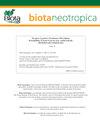鬃狼Chrysocyon brachyurus (Illiger, 1815)食用果实的发芽(食肉目,犬科)
IF 1.2
4区 环境科学与生态学
Q3 BIODIVERSITY CONSERVATION
引用次数: 0
摘要
动物传播是一个基本的过程,是许多物种种子和植物传播的主要机制。食肉目哺乳动物是最重要的分散媒介;然而,人们对犬科动物作为种子传播者的作用知之甚少。尽管鬃狼(Chrysocyon brachyurus)在种子传播中具有潜在的重要作用,但由于其相对较高的果实消耗量,很少有研究调查摄入种子的发芽率。本研究采用从两种圈养标本粪便中提取的种子(褐狼组)和直接从未消耗果实中采集的种子(对照组)进行萌发试验,对萌发率和出苗速度指数(IVE)进行了评价。我们采用5种(种)× 2(种子收集法)因子排列方法,选取塞拉多和大西洋森林中5种树木的成熟果实。种子通过鬃狼的消化道有利于美洲木犀草(Genipa americana)和瓜石榴木犀草(Psidium guajava)的萌发,延缓了牛蹄木犀草(Psidium catleanum)的萌发,维持了花椰菜(Plinia cauliflora)和无花果(Ficus obtusifolia)的萌发。结果表明,被鬃狼食用的所有植物都能萌发;因此,该物种具有很高的传播潜力,可以成为塞拉多和大西洋森林-塞拉多接触带生态系统恢复的重要盟友。本文章由计算机程序翻译,如有差异,请以英文原文为准。
Germination of fruits eaten by the maned wolf Chrysocyon brachyurus (Illiger, 1815) (Carnivora, Canidae)
Abstract Zoochory is a fundamental process that can be the main mechanism for seed and plant dispersal for many species. Mammals of the Carnivora order are among the most important dispersing agents; however, little is known regarding the role of canids as seed dispersers. Although the maned wolf (Chrysocyon brachyurus) has a potentially important role in seed dispersal, given its relatively high consumption of fruits, few studies have investigated the germination rate of ingested seeds. Here, we used seeds removed from the feces of two captive specimens (maned wolf treatment) and those directly collected from unconsumed fruits (control) in germination essays to evaluate the germination rate and emergence velocity index (IVE). We used mature fruits from five species of trees in the Cerrado and Atlantic Forest in a 5 (species) × 2 (method of seed collection) factorial arrangement. The passage of seeds through the digestive tract of the maned wolf favored the germination of Genipa americana and Psidium guajava, delayed germination of Psidium cattleianum, and maintained the germination of Plinia cauliflora and Ficus obtusifolia. Our results revealed that germination occurred for all tested plant species consumed by the maned wolf; therefore, this canid species has high dispersal potential and can be an important ally in the restoration of the Cerrado and Atlantic Forest-Cerrado contact zone ecosystems.
求助全文
通过发布文献求助,成功后即可免费获取论文全文。
去求助
来源期刊

Biota Neotropica
BIODIVERSITY CONSERVATION-
CiteScore
2.90
自引率
16.70%
发文量
0
审稿时长
4-8 weeks
期刊介绍:
BIOTA NEOTROPICA is an electronic, peer-reviewed journal edited by the Program BIOTA/FAPESP: The Virtual Institute of Biodiversity. This journal"s aim is to disseminate the results of original research work, associated or not to the program, concerned with characterization, conservation and sustainable use of biodiversity within the Neotropical region.
Manuscripts are considered on the understanding that their content has not appeared, or will not be submitted, elsewhere in substantially the same form, because once published their copyrights are transferred to BIOTA NEOTROPICA as established in the Copyright Transfer Agreement signed by the author(s).
 求助内容:
求助内容: 应助结果提醒方式:
应助结果提醒方式:


